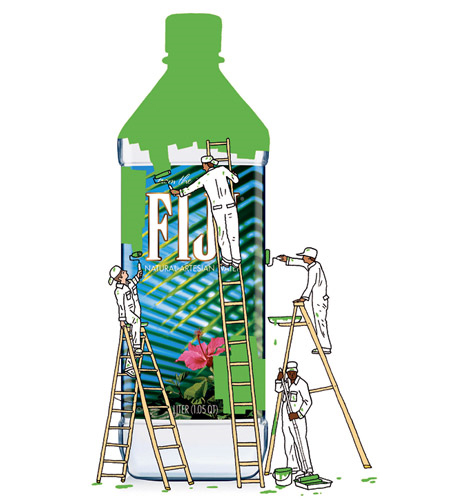
Welcome to the ezine produced by SGI Buddhists that prompts the positive, kindles the constructive, highlights the hopeful and leaves you feeling - well, up!


Fiji water is extolled by nutritionists and celebrities as the non plus ultra of liquids. Rich in silica, it is cleverly marketed as an elixir of health writes Julia Stephenson
According to its publicity blurb `Fiji water never meets the compromised air of the 21st century.’ And in a stunning example of green-wash the website triumphantly explains that the company is bringing 'clean water to people in need' in…Ethiopia.
But I’ve had bad experiences in this lovely country so I hold strident views. A few years ago, during a period of compulsive spiritual shopping I signed up on a Tony Robbins firewalking course in Fiji, hoping to `awaken the giant within'. Maddeningly I didn't awaken very much at all as I was too busy coping with my scorched feet and the deranged American heiress who was sharing my room. The firewalking soon sent her into uncontrollable hysteria resulting in the Fijian National Guard having to stand sentry outside our room to stop her drowning herself.
My nerves became even more jangled by the endless seminars during which we were kept `hydrated’ with bottles of `oxygenated’ Penta water – another ludicrously over-hyped elixir air-freighted from California. Water was poured from these plastic bottles into plastic cups which we drank out of once before being thrown away in vast plastic bin bags.
 I spent a disagreeable week jumping into rivers full of poisonous fish to learn to `trust the universe’ and listening to my fellow firewalkers rave about `swimming with Tony’, like he was some sort of magic dolphin. But all the time I was tormented by the hideous thought that we were poisoning Fijian landfill sites with festering plastic bottles and cups that were going to take thousands of years to biodegrade.
I spent a disagreeable week jumping into rivers full of poisonous fish to learn to `trust the universe’ and listening to my fellow firewalkers rave about `swimming with Tony’, like he was some sort of magic dolphin. But all the time I was tormented by the hideous thought that we were poisoning Fijian landfill sites with festering plastic bottles and cups that were going to take thousands of years to biodegrade.
Tentative suggestions that we keep our cups with us to be refilled were met with incredulous looks by our `trainer’, a brainwashed Robbins trainee who was trying to keep our team in order.
I hoped to be distracted by our growing plastic waste mountain when stormin’ Norman, the gulf war veteran, jetted in to give us a pep talk. Strutting onto the stage squeezed into a pair of tight black jeans accompanied to thrilling Top Gun footage of swooping planes he waited to take questions from the adoring audience.
`If Kuwait had exported potatoes not oil would we have invaded?’ I piped up from the back. Unsatisfied by his waffle about human rights in Kuwait I went for my Richard Gear moment. `But what about Tibet – the human rights abuses there are far worse!’ before being arm wrestled to my seat by my trainer and force fed a bottle of Fijian water. `Honey you need to re-hydrate!’.
If I’d had the strength I might have quoted from water scientist and researcher, William Marks who explains;
`When we pump freshwater from any volcanic island, such as we find in Fiji – we remove a vital life-giving force from that region of the ocean. In fact, Fiji Water brags about how remote the Fijian islands are – and thus capitalizes on the purity of Fiji water. However, this remoteness is what makes Fijian freshwater all the more valuable to the local people, their island ecosystems, and the oceanic ecosystems that have evolved in that region over millions of years’.
Consumption of bottled water in one part of the world has ripple effects in another. In some cases, essential resources are being transferred away from vulnerable communities towards consumers who already have access to clean water at a fraction of the cost.
There is worldwide competition for scarce fresh water resources in this era of rapid globalisation. In Lahore, Pakistan, Nestle operates unchecked in direct competition with local residents for precious groundwater. Poor communities like these are most likely to lack access to safe drinking water and be least empowered to defend their rights against powerful interests.
In addition to such moral complexities, there are well documented environmental impacts. The lowering of ground water tables and over extraction of local water supplies intrudes upon people’s livelihoods.
So, save some carbon emissions and leave Fijian water for the Fijians. They need all the silica they can get.

